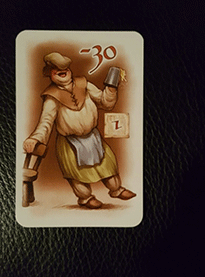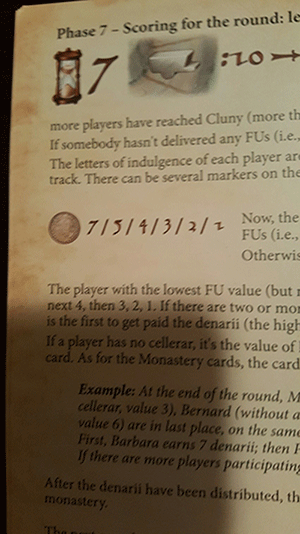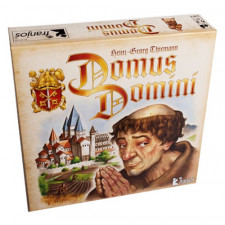Domus Domini Review
on Oct 19, 2016
As we all learned in school, much of European history deals with the Catholic Church, food production or highway hooliganism, with the Robin Hood saga combining all three to generate fun and adventure, as long as Kevin Costner’s not involved. Franjos Games takes their own shot at this trifecta with Domus Domini, delivering a game with mechanics that peg the Eurometer and also bring a healthy dose of fun and interaction.
Two to six players run French monasteries, striving to keep the Abbot of Cluny fat and happy, because his cupboard’s bare, and as is the case with all large organizations, problems roll downhill. In return for supplying the head monk with veggies, dairy products or beer, players are rewarded with victory points in the form of letters of indulgence, amply satisfying participants who like their mechanics with just a dash of historical outrage. No word yet on a Martin Luther expansion.

By my hand, and for the good of the state, the bearer has done what has been done.
This holy endeavor is divided into five turns, each with seven, but there’s a “first player†wrinkle in this game that happens before all of the monastic managing, in which whoever’s the designated starter can pass the torch, or the wooden tower, in this case, to the player on their left, spending a coin to do so. This continues until someone decides to go first, collecting all the money spent in the process. Even after several plays, we’ve yet to see a strategy emerge which benefits from this, since there are a limited number of cards to choose from in later phases, but we tried it out and pocketed the coin anyway.
Variable means of victory is a cornerstone of Euros, and the gamers’ monasteries were built using it. Each player takes it in turn to enhance their monastery’s vegetable, dairy or beer production in the ensuing phases, hiring an expert producer in one of the fields, or recruiting lay brothers (and by that I mean the traditional church term, not the…you know what, it’s best to stop there), constructing a chapel, building a dog house, or offering extra coins up to the moneylender. Lay brothers work in the fields, or pray in the chapel for a good harvest, or assault other monks on the road (for victory points, of course). Maybe that’s what the church wanted. And if you’re hammered when you do it, the Abbott’s even happier. More on that later.
To Domus Domini’s credit, there’s a lot to do, and no single strategy is guaranteed to please the Abbott- except drunks beating up cart-bearers. So the game has high replayability, and competing monks are forced to play off of the designs of others while looking for areas of the market to corner and focusing their efforts on one or two types of production. And the latter phases of each turn focus on goods delivery, with a lot more direct aggression than most Euros contain, since fortunes can swing wildly on the road to Cluny, with the Abbott rewarding all kinds of non-churchlike behavior.
After players power through the early phases, which can actually take quite a while with a large player count, since each monk completes an entire phase before the brother to their left takes a turn, they tally production and hit the road to the abbey in their food cart. And things turn sporty.
More production means you’re further down the road, and subject to the ire of your slacker brethren, who can send lay brothers to knock you backward, reducing your food total, but there is a bit of European kindness here, since players may only harass those ahead of them, so once you’re brought back into the fold, your torment ends. Except when the Drunkard is involved. The monk with the largest brewery gets this merry man added to their retinue free of charge, and he can knock a cart back even if it’s not in the lead. And the user gets a letter of indulgence, to boot.
In true strategic Euro fashion, there are ways to mitigate this, like guard dogs, which can be spent to stop these shenanigans, and the cattle herder, who the owner of the largest dairy can use to protect their cart. And in the end, the monk with the largest vegetable patch gets to use the vegetable cart to move his food further down the road. After this jockeying’s complete, the Abbott dishes out letters to each according to their station, and then rewards money inversely, with the player bringing up the rear getting the most coin.

One abbreviation. Multiple meanings.
Domus Domini skirts the narrow ledge between taking action for an unseen purpose and doing it because it makes sense to do, much like the church itself, and this combination creates a fun, varied experience that may be the very definition of its genre.

 Customer Support
Customer Support  Subscribe
Subscribe 




 Account
Account  Wishlist
Wishlist 

